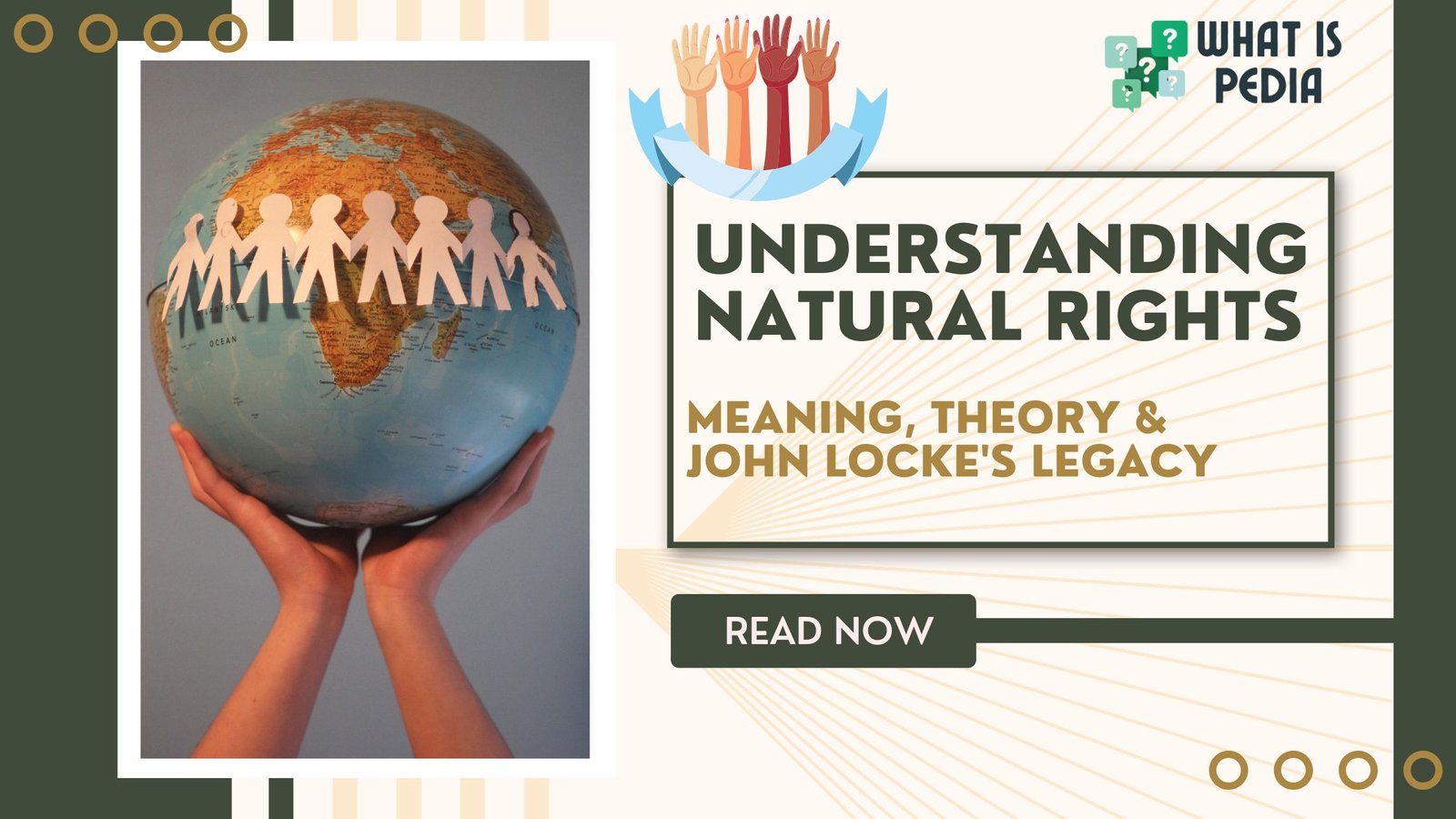Introduction
Natural rights are the fundamental rights that every human being possesses by virtue of being human. These rights are universal, inalienable, and independent of any legal or governmental system. Throughout history, natural rights have played a crucial role in shaping human civilization, democratic values, and legal frameworks. From the Enlightenment thinkers to modern human rights institutions, the belief in inherent rights has guided the evolution of justice and equality.
So, what natural rights are we talking about? These are not privileges given by states or kings; instead, they stem from human nature itself. The natural rights meaning is deeply rooted in moral philosophy and the idea that humans have intrinsic value. These include the right to life, liberty, and property—rights that cannot be justly taken away.
This blog will explore the natural rights definition, their origins in philosophy and religion, and their powerful influence on political revolutions and modern constitutions. We will also explain natural rights through examples, counter-examples, and the theory of natural rights by John Locke, one of the most influential political philosophers of all time.
📘 2. Natural Rights Meaning and Definition
The natural rights definition refers to the rights that individuals are born with and hold inherently, without needing to earn or be granted them. Unlike legal rights, which depend on laws and governance, natural rights exist independently of any system.
✉️ What are Natural Rights?
Natural rights are:
- Inherent: Everyone has them by birth.
- Inalienable: They cannot be taken away or transferred.
- Universal: They apply to all humans, regardless of race, nationality, or status.
💭 Concept of Natural Rights vs Legal Rights
Legal rights are bestowed and enforced by governments, like voting or driving licenses. On the other hand, natural rights exist whether or not a law acknowledges them. For example, the right to speak freely or defend oneself is often cited as a natural right.
⚖️ Natural Law and Natural Rights
Natural law is the moral theory that human beings possess intrinsic values that govern our reasoning and behavior. These values are often seen as the foundation for natural rights. According to natural law theorists, if a law contradicts these moral foundations, it’s unjust.
🏫 3. Historical Background and Origins
The idea of natural rights can be traced back to ancient civilizations and philosophical thought. While the term might seem modern, its roots lie in classical and medieval philosophy.
🏛️ Ancient Philosophy
Greek philosophers like Cicero believed in a universal moral order, often referred to as “natural law.” According to Cicero, laws should be rooted in reason and morality, not merely in human-made rules.
⛪ Medieval Thinkers
Christian theologians like St. Thomas Aquinas expanded on this, stating that God’s law is reflected in human nature. He believed in the existence of a moral order given by God that humans can access through reason.
🌍 Enlightenment Period
The Enlightenment brought the most dramatic transformation. Thinkers like John Locke, Jean-Jacques Rousseau, and Thomas Paine argued that governments should protect natural rights. This belief became the cornerstone of many modern democracies.
👨🏫 4. John Locke and the Theory of Natural Rights
🎓 Who Was John Locke?
John Locke (1632–1704) was an English philosopher who profoundly influenced political philosophy and modern democracy. He is best known for his theory of natural rights and social contract theory.
📄 Theory of Natural Rights by John Locke
Locke argued that humans in a state of nature are free and equal, possessing certain inalienable rights. These include:
- 🙏 Life
- ♿️ Liberty
- 🏡 Property
These are often referred to as the 3 natural rights John Locke emphasized.
⚖️ Government’s Role According to Locke
Locke believed the main purpose of government is to protect these natural rights. If a government fails to do so, citizens have the right to overthrow it. This radical idea inspired revolutions, including the American and French Revolutions.
💡 Influence on Modern Democracy
Locke’s ideas influenced the U.S. Declaration of Independence and the Indian Constitution. His belief in natural rights shaped liberal thought and continues to impact global human rights movements.
📖 5. Natural Rights Examples and Non-Examples
📊 Examples of Natural Rights
| Right | Description |
| Right to Life | No one should unjustly take your life |
| Right to Liberty | Freedom to think, speak, and move |
| Right to Property | Right to own and use belongings |
| Right to Self-Defense | Protect yourself from harm |
❌ Natural Rights Non-Examples
| Right | Why It’s Not a Natural Right |
| Right to Vote | Granted by the constitution |
| Right to Drive | Granted by a license |
| Right to Free Education | Provided by government policies |
⚖️ 6. Natural Rights and Human Rights
Human rights are the modern evolution of natural rights. Declarations like the Universal Declaration of Human Rights (UDHR) are based on the same philosophical foundations.
🌐 Global Recognition
Organizations like the United Nations promote human rights as natural rights, recognizing them as essential for dignity and equality. Freedom from torture, access to justice, and the right to life are all examples.
❌ 7. Natural Rights vs Inalienable/Unalienable Rights
💰 What Are Inalienable Rights?
Inalienable rights are rights that cannot be sold, transferred, or surrendered—even voluntarily. They are often used interchangeably with natural rights, but some differences exist.
🏰 Difference Between Natural Rights and Unalienable Rights
While natural rights are based on moral or philosophical reasoning, inalienable rights often have legal or political acknowledgment.
Example: The U.S. Declaration of Independence states that all men are created equal and endowed with certain unalienable rights, including life, liberty, and the pursuit of happiness.
🌐 8. Relevance of Natural Rights in the Modern World
🚀 Digital Age Rights
Debates are ongoing about whether access to the internet or digital privacy should be considered natural rights.
🌍 Global Examples
Countries like India and Canada have constitutions that reflect the natural rights philosophy, especially in areas like freedom of speech and the right to education.
🧠 9. Criticism and Limitations of the Natural Rights Theory
Not everyone agrees with the idea of natural rights. Critics argue:
- ⛔ They are too abstract.
- 📄 They are difficult to enforce globally.
- 🤔 Cultural differences make universal application challenging.
Some philosophers argue that rights must be legally enforced to have meaning, making natural rights more theoretical than practical in some contexts.
📙 10. Conclusion
The concept of natural rights remains a foundational idea in moral philosophy and global human rights. Understanding what natural rights are helps us recognize injustices and fight for dignity, equality, and freedom for all.
From John Locke’s theory of natural rights to modern interpretations, this idea continues to inspire revolutions, legal reforms, and humanitarian efforts worldwide.
Let us continue to question: Are we truly honoring these rights in our societies today?
🔍 Frequently Asked Questions (FAQs)
Q1: What are natural rights according to John Locke? A: Life, Liberty, and Property are the three fundamental natural rights, according to Locke.
Q2: Are natural rights the same as legal rights? A: No. Natural rights are inherent; legal rights are granted by governments.
Q3: Can natural rights be taken away? A: No. They are considered inalienable, though they can be violated.
Q4: Are human rights and natural rights the same? A: Human rights are based on natural rights but are codified in international law.
Q5: What is a non-example of a natural right? A: Driving a car—it requires legal permission.
◄️ Previous Blog Recommendation:
Joseph Shine vs Union of India: Landmark Judgment That Struck Down Adultery Law in India
Explore how the Indian judiciary reaffirmed personal liberty and dignity—key values rooted in natural rights—by striking down Section 497 IPC as unconstitutional.







